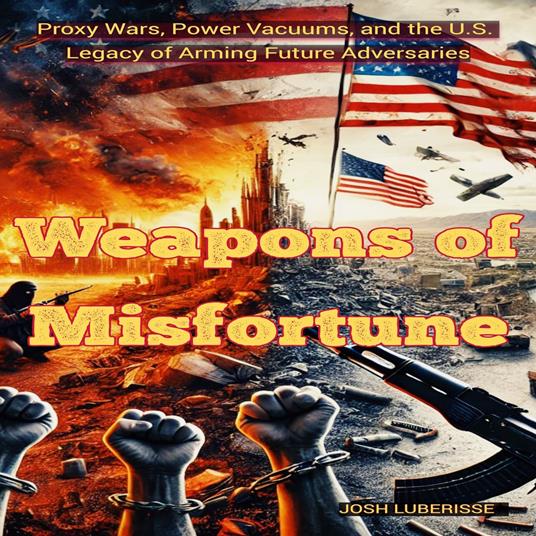Weapons of Misfortune
This audiobook is narrated by a digital voice. In the aftermath of more than seven decades of U.S. interventions in the Middle East, the region remains a complex web of proxy wars, fragile alliances, and entrenched conflicts. From the covert operations that toppled Iran's Mohammad Mosaddegh in 1953, to the ill-fated invasion of Iraq in 2003, and the chaotic withdrawal from Afghanistan in 2021, U.S. foreign policy in the Middle East has been marked by a recurring pattern of short-term victories at the cost of long-term stability. Yet, time and again, the United States has engaged in conflicts driven by a mixture of geopolitical ambitions, strategic miscalculations, and ideological commitments, often leaving the region more unstable than before. From the Cold War's ideological struggles to the War on Terror's fight against jihadism, Weapons of Misfortune critically examines the global implications of U.S. interventions—how the decisions to arm insurgents, back proxy forces, and topple regimes have inadvertently created power vacuum that birthed insurgencies, extremist movements, hostile regimes and enduring instability. The focus is on how U.S. actions, whether driven by ideological goals, the desire for geopolitical dominance, or securing immediate security interests, have often backfired, empowering adversaries from al-Qaeda to ISIS, and allowing other global players like Russia and China to expand their influence in regions once dominated by the U.S. This book provides a detailed analysis of pivotal events—such as the Iranian Revolution of 1979, the rise of ISIS, the civil war in Yemen and Syria, the fall of Muammar Gaddafi in Libya, and the post-9/11 invasions of Afghanistan and Iraq —to illustrate how the U.S.'s reliance on military force and proxy alliances has frequently undermined its long-term strategic objectives. -backed wars have contributed to refugee crises, sectarian violence, and the destabilization of entire regions. Weapons of Misfortune reveal the recurring flaws in U.S. strategy: a tendency to prioritize immediate tactical victories over the nuanced political, social, and economic realities of the countries it seeks to influence. Through a meticulous analysis of the historical context of U.S. actions, this book offers a clear-eyed reflection on the failures of regime change, the pitfalls of arming proxy forces, and the unintended consequences of creating power vacuums that allow insurgent groups like al-Qaeda, ISIS, and the Taliban to thrive. The book's critical reflection on U.S. interventions offers not only a sober assessment of past mistakes but also lessons for the future. It suggests potential strategies for how the U.S. can re-engage in the Middle East—and other volatile regions—without repeating the same errors. By embracing diplomacy, multilateral cooperation, and a deeper understanding of local dynamics, the book argues that the U.S. can move away from its over-reliance on military solutions and instead promote stability, good governance, and sustainable development in a region that remains pivotal to global security. As the U.S. faces a shifting global order, marked by the rise of China, Russia, and other regional powers, Weapons of Misfortune serves as a timely reminder that the choices made in distant capitals have real and lasting consequences on the ground. By reflecting on the lessons of the past, this book offers a roadmap for a more nuanced, responsible, and contextually informed approach to U.S. foreign policy in the Middle East and beyond.
-
Autore:
-
Durata in (hh:mm:ss):10:36:26
-
Anno edizione:2024
-
Editore:
Formato:
Gli Audiolibri venduti dal nostro sito sono in formato MP3 e protetti da un DRM proprietario Kobo.
Compatibilità:
Gli Audiolibri venduti dal nostro sito possono essere ascoltati sul tuo smartphone o tablet tramite la APP gratuita Kobo Books scaricabile da iOS o Android. Gli Audiolibri non possono essere scaricati in locale o trasferiti su un client di ascolto diverso da quello fornito tramite Kobo. Non è possibile ascoltare gli audiolibri con la Kobo APP Desktop. Puoi ascoltare gli Audiolibri tramite determinati eReader Kobo, utilizzando cuffie o casse con Bluetooth. Visita la pagina degli eReader per avere maggiori dettagli.
Cloud:
Gli Audiolibri venduti singolarmente dal nostro sito sono immediatamente sincronizzati sul tuo account personale in automatico. Successivamente all'acquisto, sono subito disponibili all'ascolto tramite i client di lettura Kobo compatibili.
Clicca qui servissero ulteriori informazioni



